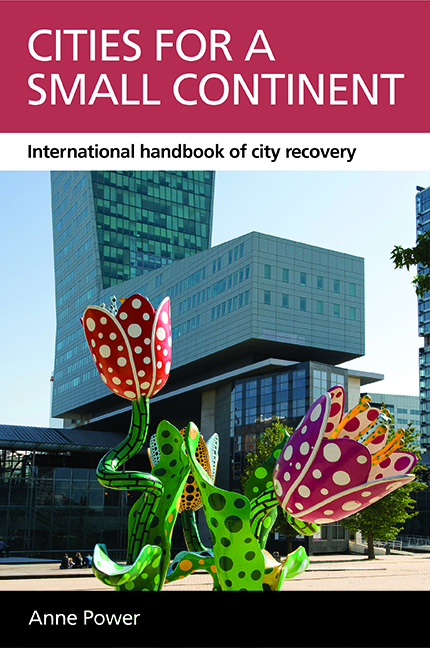Book contents
- Frontmatter
- Contents
- List of tables and figures
- Abbreviations and acronyms
- Acknowledgements
- Copyright material
- Foreword
- one Lessons from cities in a crowded continent Tale of a city – Bilbao
- two Divided and united Europe Tale of a city – Belfast
- three Grit and vision Tale of a city – Sheffield
- four Struggle and strive Tale of a city – Lille
- five Threats and opportunities Tale of a city – St Étienne
- six Over-scale and under-scale Tale of a city – Torino
- seven The power of social innovation Tale of a city – Leipzig
- eight Shoots of growth in older industrial cities in the US Tale of a city – Detroit
- nine Finding new ways out of the woods
- Endnotes
- References
- Afterword
- La Fabrique de la Cité
- Index
seven - The power of social innovation Tale of a city – Leipzig
Published online by Cambridge University Press: 01 September 2022
- Frontmatter
- Contents
- List of tables and figures
- Abbreviations and acronyms
- Acknowledgements
- Copyright material
- Foreword
- one Lessons from cities in a crowded continent Tale of a city – Bilbao
- two Divided and united Europe Tale of a city – Belfast
- three Grit and vision Tale of a city – Sheffield
- four Struggle and strive Tale of a city – Lille
- five Threats and opportunities Tale of a city – St Étienne
- six Over-scale and under-scale Tale of a city – Torino
- seven The power of social innovation Tale of a city – Leipzig
- eight Shoots of growth in older industrial cities in the US Tale of a city – Detroit
- nine Finding new ways out of the woods
- Endnotes
- References
- Afterword
- La Fabrique de la Cité
- Index
Summary
Concentrated wealth can limit economic performance. Under the right rules, shared prosperity and strong economic performance reinforce each other. There is no trade off.
Joseph E. Stiglitz, Rewriting the Rules of the American EconomyBox 7.1: Torino – a story
Arrival in Torino by train is spectacular – you either head towards the Alps from Milan, or you descend into Torino from a majestic climb over the snow-capped passes of Europe's highest mountain range.
Torino is super-dense, so trains, trams, buses, metro and now yellow city bikes are everywhere. There is another, even more collective side to the city. Very few people know or remember Torino's ‘social saints’ who, in the 19th century, rescued the destitute, children, women, youth and men, from the gutters and shacks of a filthy, impoverished city. Even fewer people recognise the universal contribution of labour unions, resident-led housing protests, and mutually owned, non-profit businesses to the rapid social development of Italy, post-Second World War.
Social enterprise must have been born in Torino. New social movements of the 21st century seem to flourish in a city of engineers, tourist traders and civic activists. Non-profit cooperatives, alternative community organisations, religious charities, bank foundations warm to the city's appeal for help to meet a crisis of homelessness. The proactive, civic-minded city of Torino partners with these non-profit organisations in a battery of projects to help the destitute. Social enterprises organise community learning, social events, vegetable planting, libraries, music sessions. They invite people needing their help to become volunteers in providing the services – a true mutual aid.
Don Bosco, a famous social reformer of the 19th century, developed the now international movement to help combat homelessness through shelters and children's refuges in his home city of Torino; today, Torino's social inventions are carried across the world – just as they were 150 years ago.
Introduction
The major transformations in many of Europe's cities led to their social fabric wearing thin in many places. Europe has seen sharp increases in inequality, joblessness, particularly among young people, hardship of all kinds and simple poverty. These harsh realities are felt very unevenly. Struggling cities, which never fully caught up with the boom years of the 2000s either in incomes or in overall prosperity, have suffered harsher impacts than average.
- Type
- Chapter
- Information
- Cities for a Small ContinentInternational Handbook of City Recovery, pp. 219 - 256Publisher: Bristol University PressPrint publication year: 2016



